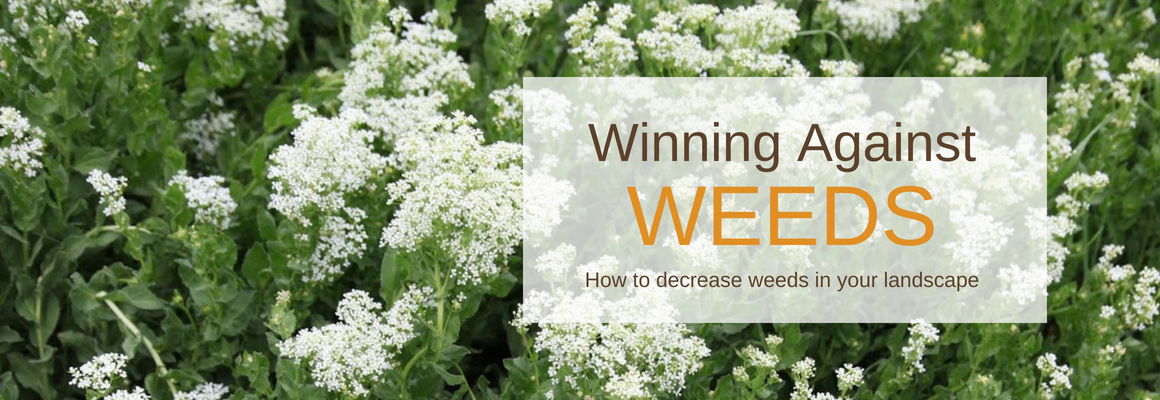
Winning Against Weeds
-
Whoever wrote “A job done well never needs redoing” has never weeded a garden! If you’ve ever felt helpless trying to control weeds,you’re not alone, nor are you entirely wrong. Weeds are very hard to control.There are many reasons why this is so: weed seeds are everywhere, they can popup wherever they have an open patch of ground, they have many ways to defeat your control methods, they spread from both seed and root, no single control method works on all weeds, and since they come from the same plant families of our favorites desirable plants, anything you decide to spray on them can kill those favorite plants as well. All is not lost, however. There are a few basic things we can do to prevent weeds from getting out of control.
-
Keep the seeds from arriving
A huge source of weed seeds is delivered with your topsoil. It usually isn’t screened and can bring many seeds into your landscape. Using a good compost covering on your bare soil can, in a short time, restore topsoil and is a good alternative to bringing it in from the outside. Compost is another opportunity for weeds to be brought in, so be sure to buy from a good source (one that lets its compost heat up to a temp of 140 degrees). Ask about this! Good composters know how hot their compost gets.
Once you have the right compost, spread it in a thick enough layer to shade the soil surface. Weed seed in the soil needs sunlight to germinate and grow. However, in order to be effective, it must be thick enough to fully block out the sunlight. Open areas between plants should have a compost layer 2-4" deep. At the base of plants, it's okay to have a thinner layer to avoid placing compost on the crown of the plant.
-

Prevent the weeds from getting established
Even the most careful prevention steps can allow seed arrival, so limiting establishment and spread is the next step. To do this, avoid disruption of the compost covering your soil. Uncovered ground gives weeds a place to grow.
Next, use a drip watering system. Watering below the mulch layer leaves weed seeds on the ground in the dark and seeds on top of the mulch layer without water to germinate. Keeping your lawn healthy is the best defense against weeds establishing in your lawn. Using a string trimmer along the edge of a sidewalk or driveway can make the lawn too short in that area to out-compete weeds, so using an edger will be more effective.
-
Remove existing weeds before they develop seeds
Using a weed tool, dig out existing weeds as deep into the roots as you can. Weeding this way on a regular schedule can prevent your weeds from developing seeds and creating more weeds. If you plan to use an herbicide,make sure you read the label—it has important information on which plants it kills, what sites are acceptable, and even the mode it uses to kill those plants. Also keep in mind that herbicides can’t tell the difference between weeds and your beloved perennials.
-
Accept that weeds area fact of life
There is no way to defeat weeds entirely. We can merely suppress weeds to a level that we can live with. Weeds are a battle that will be ongoing for as long as we own land.
To learn more about controlling weeds in the landscape, register to attend our upcoming class on the topic.
Common Utah Weeds & How to Control Them
Thursday, May 17, 2018
Conservation Garden Park Education Center
6:30 pm
Tickets are required to attend and this class always sells out-- so grab your spot early! Register here: https://conservationgardenpark.org/events/1035/common-utah-weeds--how-to-control-them -


